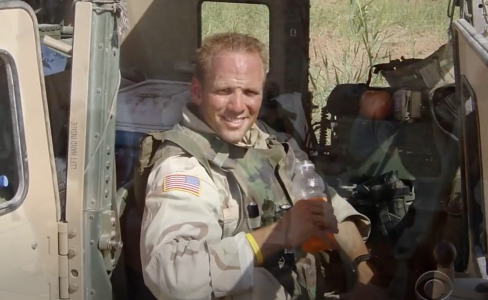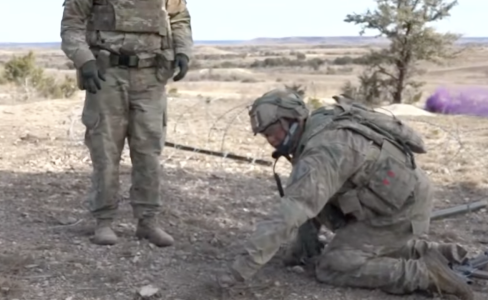Hero’s mission: Veteran who lost his legs in Iraq battles to stop “wounded warriors” tax
- Replies 0
When Army veteran Dan Nevins signed up to serve his country, he knew the risks. He faced them head-on in Iraq, where a roadside bomb changed his life forever—costing him both legs and sending him on a grueling journey of recovery.
But nothing prepared him for the fight waiting back home.
Instead of receiving the full benefits he earned, Dan found himself caught in a policy that penalizes wounded veterans like him—reducing their retirement pay simply because they were injured.
If that sounds wrong to you, you’re not alone. Here at The GrayVine, we believe in honoring promises—especially to those who’ve sacrificed so much. So let’s take a closer look at what’s going on, why it matters, and how you can help make it right.
The “Wounded Veterans Tax”: What Is It, and Who Does It Hurt?
Imagine serving your country, suffering life-altering injuries, and then being told you can’t receive the full benefits you earned. That’s the reality for about 50,000 veterans, according to the Congressional Budget Office.
The so-called “wounded veterans tax” refers to a federal policy that prevents certain disabled veterans from collecting both their full military retirement pay and their disability compensation.

Here’s how it works: If a veteran has less than 20 years of service and a disability rating under 50%, every dollar they receive in disability compensation is subtracted from their retirement pay.
For many, that’s a loss of about $1,900 a month—money that could make a world of difference for families already facing the challenges of life after combat.
Dan Nevins, who lost both legs in Iraq which caused a forced medical retirement, was stunned when he learned about this policy.
“I was told I could not receive both,” he recalls. “And I was like, ‘Wait a minute. That’s not what I thought was going to happen.’”
After 36 surgeries and 18 months at Walter Reed Hospital, Nevins had already paid a steep price. The financial blow felt like salt in the wound.
A Story of Sacrifice and Resilience
Nevins’s story is one of courage, loss, and determination. When an IED exploded beneath his vehicle in 2004, he lost his platoon sergeant and, eventually, both legs below the knee.
He remembers the moment vividly—not as a flash of his life, but as a slideshow of unfinished business.
“The last sort of vision, it was my 10-year-old daughter, but she was all grown up and dressed in white head to toe, and walking down the aisle without her dad. And I was like, ‘I’m alive. I have to do something to keep it that way.’”
Source: KCENNews / Youtube.
After his recovery, Nevins didn’t just adapt—he thrived.
He became a certified yoga instructor, inspiring others with his resilience. But the financial reality of the “wounded veterans tax” was a bitter pill to swallow.
“It’s a tragedy, really,” he says. “So many people are cutting what we would all take for granted out of their lives, just so they can survive.”
The Push for Change: The Major Richard Star Act
Nevins isn’t alone in his fight. Lawmakers from both sides of the aisle are rallying behind the Major Richard Star Act, a bill that would finally allow wounded veterans to receive both their full retirement and disability pay.
The bill is named after Major Richard Star, a decorated combat veteran who lost his battle with cancer while fighting for this very cause.
Senator Richard Blumenthal (D-Conn.) and Representative Gus Bilirakis (R-Fla.) are leading the charge, with overwhelming bipartisan support—71 co-sponsors in the Senate and 274 in the House.
“They’re being penalized for being wounded,” Blumenthal says. “It’s about simple justice and fairness.”
But, as with so many things in Washington, money is the sticking point.
Source: CBS Evening News / Youtube.
The Congressional Budget Office estimates the bill would cost $9.75 billion from 2024 to 2033. In an era of budget cuts in government spending, including the Veterans Affairs Department, that’s a tough sell—even when the cause is as just as this one.
The True Cost of Service
For many veterans, the “wounded veterans tax” isn’t just about dollars and cents—it’s about dignity, respect, and keeping promises. These are men and women who were forced to retire early because of injuries sustained in service. They didn’t choose to leave; their bodies gave them no choice.
The current policy sends a troubling message: that the nation’s gratitude has limits, and that financial support is conditional.
As Nevins puts it, “We should keep our promises. I teach my kids to keep their promises, even when it’s not convenient for them.”
Also read: Big changes for veterans’ families: What the new VA survivor benefits mean for you
Veterans Standing Together
Nevins isn’t fighting alone. He’s joined by fellow veterans like Marine Corps veteran Jamel Daniels, who also lost a leg in combat.
The two met during their recoveries, racing wheelchairs down hospital hallways and forging a bond that now fuels their advocacy. Together, they’re taking their fight to Capitol Hill, urging lawmakers to do the right thing.
Ahead of Memorial Day, Nevins and Daniels stood side by side at a press conference, reminding the nation that honoring veterans means more than parades and speeches—it means action.

What’s Next? The Road Ahead for the Major Richard Star Act
Senator Blumenthal is determined to see the bill through, whether as a standalone measure or as an amendment to the annual defense policy bill.
He’s even considering bringing it up for unanimous consent, daring to “see who has the nerve to come forward and say we should deny our veterans basic fairness.”
The Department of Veterans Affairs, for its part, has promised not to cut healthcare or benefits, but has stayed mum on the pending legislation. The Department of Defense hasn’t commented either.
Read next: Veterans across the US could soon see more money—are you one of them?

Have you or a loved one been affected by the “wounded veterans tax”? Do you have thoughts on how our country can better support those who’ve sacrificed so much? We want to hear from you! Share your stories, opinions, and questions in the comments below!
Let’s honor our veterans not just with words, but with action. After all, a promise made should be a promise kept—no matter how inconvenient it may be.
But nothing prepared him for the fight waiting back home.
Instead of receiving the full benefits he earned, Dan found himself caught in a policy that penalizes wounded veterans like him—reducing their retirement pay simply because they were injured.
If that sounds wrong to you, you’re not alone. Here at The GrayVine, we believe in honoring promises—especially to those who’ve sacrificed so much. So let’s take a closer look at what’s going on, why it matters, and how you can help make it right.
The “Wounded Veterans Tax”: What Is It, and Who Does It Hurt?
Imagine serving your country, suffering life-altering injuries, and then being told you can’t receive the full benefits you earned. That’s the reality for about 50,000 veterans, according to the Congressional Budget Office.
The so-called “wounded veterans tax” refers to a federal policy that prevents certain disabled veterans from collecting both their full military retirement pay and their disability compensation.

Many wounded veterans like Dan Nevins are unable to receive both their full retirement pay and disability compensation due to a federal policy known as the “wounded veterans tax”. Image source: CBS Evening News / Youtube.
Here’s how it works: If a veteran has less than 20 years of service and a disability rating under 50%, every dollar they receive in disability compensation is subtracted from their retirement pay.
For many, that’s a loss of about $1,900 a month—money that could make a world of difference for families already facing the challenges of life after combat.
Dan Nevins, who lost both legs in Iraq which caused a forced medical retirement, was stunned when he learned about this policy.
“I was told I could not receive both,” he recalls. “And I was like, ‘Wait a minute. That’s not what I thought was going to happen.’”
After 36 surgeries and 18 months at Walter Reed Hospital, Nevins had already paid a steep price. The financial blow felt like salt in the wound.
A Story of Sacrifice and Resilience
Nevins’s story is one of courage, loss, and determination. When an IED exploded beneath his vehicle in 2004, he lost his platoon sergeant and, eventually, both legs below the knee.
He remembers the moment vividly—not as a flash of his life, but as a slideshow of unfinished business.
“The last sort of vision, it was my 10-year-old daughter, but she was all grown up and dressed in white head to toe, and walking down the aisle without her dad. And I was like, ‘I’m alive. I have to do something to keep it that way.’”
Source: KCENNews / Youtube.
After his recovery, Nevins didn’t just adapt—he thrived.
He became a certified yoga instructor, inspiring others with his resilience. But the financial reality of the “wounded veterans tax” was a bitter pill to swallow.
“It’s a tragedy, really,” he says. “So many people are cutting what we would all take for granted out of their lives, just so they can survive.”
The Push for Change: The Major Richard Star Act
Nevins isn’t alone in his fight. Lawmakers from both sides of the aisle are rallying behind the Major Richard Star Act, a bill that would finally allow wounded veterans to receive both their full retirement and disability pay.
The bill is named after Major Richard Star, a decorated combat veteran who lost his battle with cancer while fighting for this very cause.
Senator Richard Blumenthal (D-Conn.) and Representative Gus Bilirakis (R-Fla.) are leading the charge, with overwhelming bipartisan support—71 co-sponsors in the Senate and 274 in the House.
“They’re being penalized for being wounded,” Blumenthal says. “It’s about simple justice and fairness.”
But, as with so many things in Washington, money is the sticking point.
Source: CBS Evening News / Youtube.
The Congressional Budget Office estimates the bill would cost $9.75 billion from 2024 to 2033. In an era of budget cuts in government spending, including the Veterans Affairs Department, that’s a tough sell—even when the cause is as just as this one.
The True Cost of Service
For many veterans, the “wounded veterans tax” isn’t just about dollars and cents—it’s about dignity, respect, and keeping promises. These are men and women who were forced to retire early because of injuries sustained in service. They didn’t choose to leave; their bodies gave them no choice.
The current policy sends a troubling message: that the nation’s gratitude has limits, and that financial support is conditional.
As Nevins puts it, “We should keep our promises. I teach my kids to keep their promises, even when it’s not convenient for them.”
Also read: Big changes for veterans’ families: What the new VA survivor benefits mean for you
Veterans Standing Together
Nevins isn’t fighting alone. He’s joined by fellow veterans like Marine Corps veteran Jamel Daniels, who also lost a leg in combat.
The two met during their recoveries, racing wheelchairs down hospital hallways and forging a bond that now fuels their advocacy. Together, they’re taking their fight to Capitol Hill, urging lawmakers to do the right thing.
Ahead of Memorial Day, Nevins and Daniels stood side by side at a press conference, reminding the nation that honoring veterans means more than parades and speeches—it means action.

The policy affects around 50,000 veterans, often costing them as much as $1,900 per month in lost benefits if they served less than 20 years and have a disability rating under 50%. Image source: KCENNews / Youtube.
What’s Next? The Road Ahead for the Major Richard Star Act
Senator Blumenthal is determined to see the bill through, whether as a standalone measure or as an amendment to the annual defense policy bill.
He’s even considering bringing it up for unanimous consent, daring to “see who has the nerve to come forward and say we should deny our veterans basic fairness.”
The Department of Veterans Affairs, for its part, has promised not to cut healthcare or benefits, but has stayed mum on the pending legislation. The Department of Defense hasn’t commented either.
Read next: Veterans across the US could soon see more money—are you one of them?
Key Takeaways
- Many wounded veterans like Dan Nevins are unable to receive both their full retirement pay and disability compensation due to a federal policy known as the “wounded veterans tax”.
- The policy affects around 50,000 veterans, often costing them as much as $1,900 per month in lost benefits if they served less than 20 years and have a disability rating under 50%.
- Bipartisan efforts in Congress, through the Major Richard Star Act, aim to abolish this offset and allow wounded veterans to receive both their full retirement and disability payments, but concerns remain over the bill’s estimated $9.75 billion price tag.
- Advocates, including Nevins and supportive lawmakers, argue that denying full benefits to wounded veterans is unjust and contrary to Australia’s (and the US’s) commitment to those who have served, with calls to keep promises made to veterans regardless of cost challenges.
Have you or a loved one been affected by the “wounded veterans tax”? Do you have thoughts on how our country can better support those who’ve sacrificed so much? We want to hear from you! Share your stories, opinions, and questions in the comments below!
Let’s honor our veterans not just with words, but with action. After all, a promise made should be a promise kept—no matter how inconvenient it may be.





